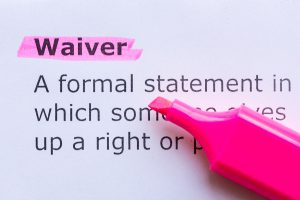Waivers And Adventure Activities
 Michael Babboni
Personal Injury
Adventure. It’s out there waiting for anyone who wants to experience it, especially in Florida. Thanks to the plethora of activities in the state there is always something for residents and visitors to take part in – ziplining, parasailing, waterskiing, roller coasters, bungee jumping, and more.
Michael Babboni
Personal Injury
Adventure. It’s out there waiting for anyone who wants to experience it, especially in Florida. Thanks to the plethora of activities in the state there is always something for residents and visitors to take part in – ziplining, parasailing, waterskiing, roller coasters, bungee jumping, and more.But thanks to the inherently risky nature of these activities, injuries do occur. And since practically every thrill activity operator requires participants to sign waivers, it’s easy for those involved in an accident to immediately assume that they have no rights to seek compensation for their injuries.
This isn’t the case, however, and it’s important to learn more about your rights if you’ve been injured in an adventure activity -even if you signed a waiver ahead of time. Talking to a personal injury lawyer is the best way to know all of your options, but reviewing the basics can help you understand a few things before your consultation visit.
Accepting Your Risk
The first thing to understand is that the wavier you sign does indeed help provide some level of protection to the operator of the pursuit you’re engaging in. In most cases, those waivers are essentially you agreeing that you understand the risks involved in what you’re about to do and that you accept them.
For example, you agree that some injuries may occur due to the nature of the adventure. You also agree that you’re accepting that possibility. If you’re injured during regular, routine operation of the pursuit you may have little legal recourse. You may also have few options if you’re injured due to unforeseen circumstances that nobody could have predicted.
Recklessness And Negligence
However, there are some cases where you do have rights. This generally relies on showing that the operator of the attraction in question acted in a reckless or negligent way and that those actions were what led to your injuries. It’s also important to show that you had no way of knowing or recognizing those actions. Here are some examples.
- The staff hasn’t been fully trained in all proper safety procedures.
- Safety equipment malfunctions due to poor maintenance
- No inspections are properly conducted
- The staff ignores weather conditions or warnings that could impact safety
- The operator isn’t properly licensed for the appropriate activity
- The company fails to explain all of the risks
- The company fails to properly educate participants on proper techniques
The bottom line is that if it can be shown that there are risk factors that shouldn’t be present, seeking compensation is most likely very possible – even if a waiver was signed. This is because the wavier is signed with the understanding that some risks exist and you’re accepting them, but when problems exist that you have no way of knowing about, you aren’t accepting those risks.
In other words, you can’t reasonably be expected to accept risks that you didn’t know about. It’s the responsibility of the operator to ensure that all proper safety precautions are taken in order to make the experience as safe as it possibly can be. If they fail to do so, a waiver may not protect them.
What To Do
So what should you do if you’ve been injured in an incident involving adventure activities? The simple answer is that you should talk to a professional. A good personal injury lawyer can help you identify what your rights are and make it easier to understand what steps you need to take. Recovery can be difficult when facing a financial burden, and getting compensation could help your recovery go much more smoothly. Even if you’ve signed a waiver, you have rights. Our team could help. Contact us today to get a consultation and learn more.
